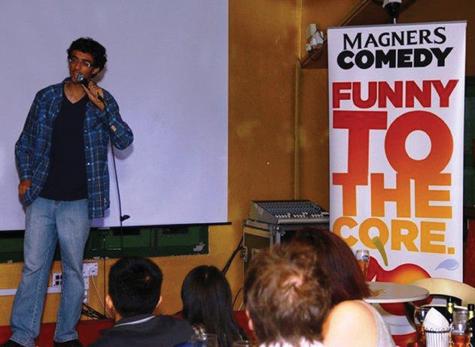
Born and raised on the independent Southeast Asian island of Singapore, senior Zoab Kapoor has pursued a range of very diverse interests since his youth.
“My ideal career goal is ‘physicist who is a comedian in the evenings,’” Kapoor said. “That would be strange, I admit, kind of unconventional, don’t think many people have done it, but it would be awesome.”
Kapoor lived in Singapore until last November, when his father took a job at the University of California, Berkeley and his family moved to Mill Valley. In Singapore, Kapoor independently researched sciences of interest, specifically physics and performed stand up comedy. Kapoor recalled when he first got involved with Singapore’s comedy scene.
“One of my dad’s friends knew someone who was kind of involved in the stand-up comedy scene in Singapore, which was really, really small. I was introduced to that person, and eventually I managed to get a gig. Normally, it’s tough for you to get a gig when you’re a 14-year-old comedian, because you’re not really allowed into clubs, or places that serve alcohol—you’re not really supposed to be there. I found this one comedy club that was more relaxed about the rules. So then I went, and I did a gig, and since then I’ve just kind of been rolling with it,” he said.
Kapoor has performed several comedy routines in Singapore, as well in the United States. Recently, he participated in a comedy festival in Los Angeles, and he plans to begin performing gigs in the Bay Area.
Since moving, Kapoor has noticed significant differences between the social environments of his old and new homes. When asked what changes were most apparent after the move, Kapoor replied in complete deadpan. “Well, there was a lot less weed in Singapore. I don’t know if it’s the electric chair or lethal injection, but you get the chair [if you smoke marijuana in Singapore]. Their reasoning is that ‘if we kill people who do it, then people won’t do it.’ It’s a zero tolerance policy.” Kapoor paused, considering his response, then smiled. “It’s negative tolerance,” he said.
Kapoor also observed a large disparity in study habits between students in Singapore and Mill Valley.
“In Singapore, basically everyone’s working really hard, and wants to get the best grades, whether in a local school or an international school. As opposed to here, where working hard is the… exception. To put this in perspective, I was the slacker in my class in Singapore. But here, I guess comparatively, I’m relatively studious. [Now I’m] not so much the slacker. I haven’t changed. Everyone around me has.”
Last semester, Kapoor was one of only 13 students in the Class of 2013 to receive a college book award from Tam’s faculty. The awards commended students on particular aptitude in certain disciplines. Kapoor’s, from MIT, was based on his work in the sciences, specifically chemistry.
Kapoor’s somewhat unique embrace of both academics and comedy has allowed both experiences to inform each other. “I like to use stuff often from what I’m learning; often what I’m learning in school is a basis for my [comedy] material. Not necessarily just complicated stuff. You know if you think of something funny related to an economics class, then I would develop that and turn it into a joke.”
The practical nature of physics and the abstract art of comedy seem like two subjects that are irreconciable, but Kapoor disagrees. “I don’t think definitively you can say that one career is better than the other, I know everyone’s just like, ‘oh yeah, scientists are the best!’ but they’re both very valuable[…] I’m a strong believer that comedy is great in that it unites people through making them laugh, and it makes people happier,” he said.
Kapoor’s experience in comedy has also taught him valuable lessons about failure and patience.
“The first time [I didn’t get any laughs in a routine] it was really awkward, because, as any actor or musician would pause for applause, a comedian’s going to pause for laughs,” he said. “And if your joke doesn’t work, and you pause for a laugh, and you just don’t get anything, it feels really weird and awkward. But you just have to pick yourself up and move beyond it without even thinking about it. If you let your set go to hell because of one badly received joke, you’re not going to work out as a comedian.”


